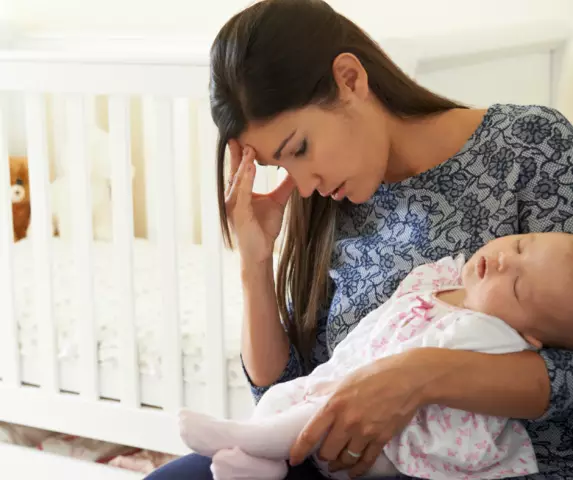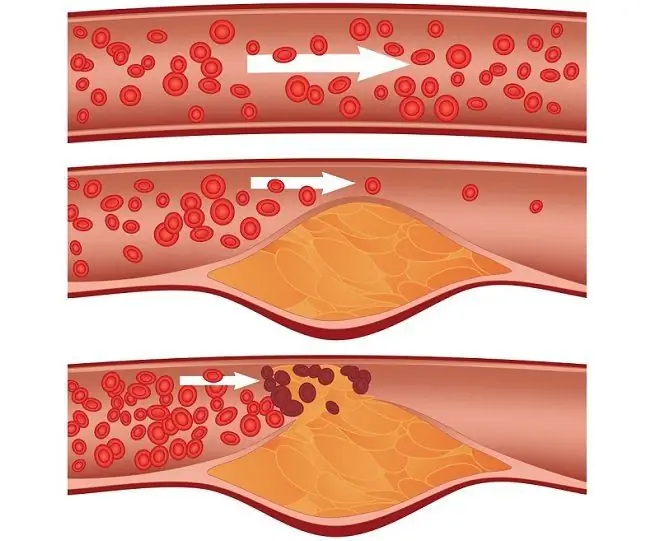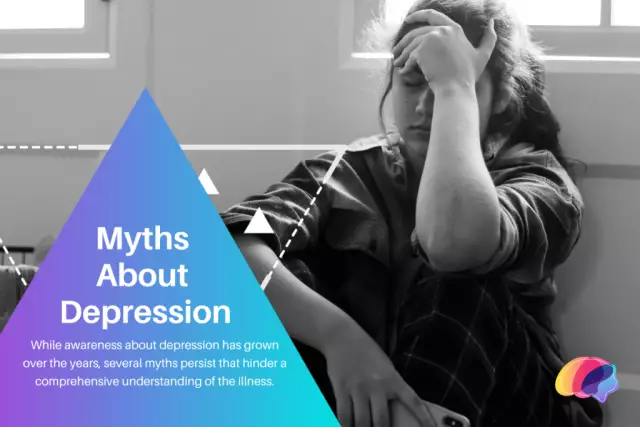- Author Rachel Wainwright wainwright@abchealthonline.com.
- Public 2023-12-15 07:39.
- Last modified 2025-11-02 20:14.
Postpartum depression

Postpartum depression is a type of clinical depression that affects women, less often men, usually after childbirth. According to studies, the prevalence of postpartum depression among women ranges from 5% to 25%, among men, especially young fathers, the incidence of postpartum depression ranges from 1% to 25.5%.
The causes of postpartum depression and the mechanisms of its detection are not fully understood. According to a study conducted in the United States, it was found that postpartum depression in women can be predicted with an 85% probability by a chemical change in the DNA of 2 genes using a blood test during pregnancy.
Sometimes postpartum depression is confused with postpartum psychosis, the consequences of which are much more serious. It is much less common and is accompanied by disturbances in the thinking process, delirium, hallucinations, disorganized speech and behavior.
Postpartum depression can lead to incompatibility between the mother and the child, as women with this diagnosis often pay more attention to negative events associated with caring for a child.
Causes of Postpartum Depression
The etiology of postpartum depression is not fully understood. Some studies show that the causes of postpartum depression are a lack of vitamins in the body. Other research suggests that significant changes in a woman's hormonal levels during pregnancy are more likely to cause postpartum depression. However, it remains unclear why only 10-15% of women suffer from postpartum depression, because changes in the hormonal background occur in absolutely all women in labor.
How long does postpartum depression last?
Mild postpartum depression (mild, short bouts of depression) begins to develop within the first four or five weeks after delivery and lasts up to 6 months. In 10-20% of cases, postpartum (perinatal) depression in severe form (with attacks of psychosis) is a consequence of mild depression and can last up to a year or more. In general, how long postpartum depression lasts depends on the person himself, since the main sign of the development of the disease is the unwillingness to seek help.
Postpartum depression symptoms
The symptoms of postpartum depression are:
- Anxiety, anger, or irritability;
- Sadness and sadness;
- Feelings of depression and guilt;
- Fear of harming the child or yourself;
- Excessive anxiety or complete lack of interest in the child;
- Lack of energy;
- Hopelessness;
- Social self-isolation;
- Headaches, chest pains, heart palpitations, numbness or tingling in the hands or feet, rapid shallow breathing;
- Sleep problems;
- Lack of appetite;
- Focus and memory problems
- Low self-esteem;
- Impossibility to make simple decisions;
- Decreased libido;
- Lack of interest in what was previously of interest.
Risk factors for postpartum depression
Although the causes of postpartum depression are not fully understood, it is believed that there are a number of factors that increase the predisposition to its occurrence, including:
- Physiological injuries that occurred during childbirth;
- Increased prolactin levels;
- Depletion of oxytocin;
- Replacing breastfeeding with artificial feeding;
- Smoking;
- Low self-esteem;
- Prenatal depression during pregnancy;
- Low social support;
- Lifestyle accompanied by constant stress;
- Negative marital relationships;
- Lonely marital status;
- Low socio-economic status;
- Unplanned or unwanted pregnancy.

These factors are known to correlate with postpartum depression. Correlation in this case means that high rates of prenatal depression are associated with high rates of postpartum depression and low rates of prenatal depression are associated with low rates of postpartum depression.
Postpartum depression treatment
Numerous scientific studies and scientific articles support the idea that postpartum depression can be treated using a variety of methods. If the causes of postpartum depression are associated with social factors (lack of money, lack of support), treatment should be aimed at softening and building relationships with a partner, attracting additional assistance in caring for children from relatives, cognitive therapy, and others.
Other treatment options for postpartum depression include:
- Medical examination to rule out physiological problems;
- Cognitive Behavioral Therapy (a form of psychotherapy);
- Taking special medications;
- Visiting help groups;
- Healthy food;
- Healthy sleep.
An experienced doctor will develop a treatment plan for postpartum depression individually for each case. This plan can include any combination of the above treatment options as well as some partner work.
YouTube video related to the article:
The information is generalized and provided for informational purposes only. At the first sign of illness, see your doctor. Self-medication is hazardous to health!






